Despite the similarities of their names, chiggers and jiggers are very different. They don’t even belong to the same class of animals in the animal kingdom! Before you get them confused, let’s learn more about chiggers vs jiggers. One is dangerous and the other is just irritating.
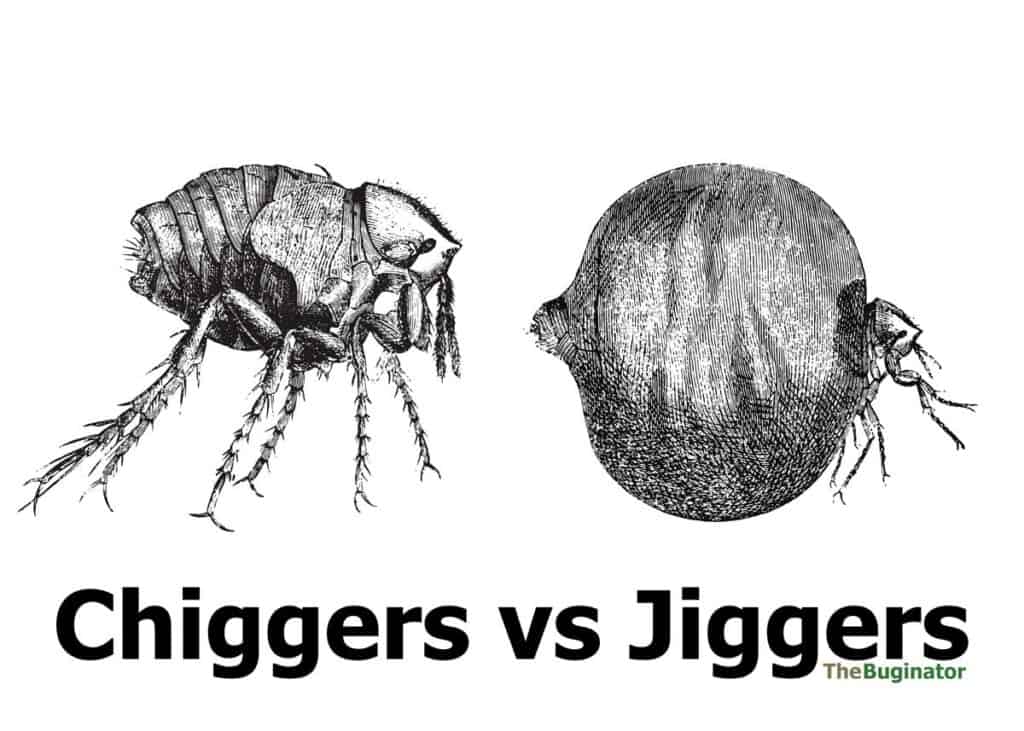
Table of Contents
Chiggers
Scientific name: Trombiculidae
Common names: Chigger, red bug, berry bug, harvest mite, scrub-itch mite
Range: Worldwide
Habitat: Forests and grasslands
Appearance: Small red bodies
Risk to humans: Mild
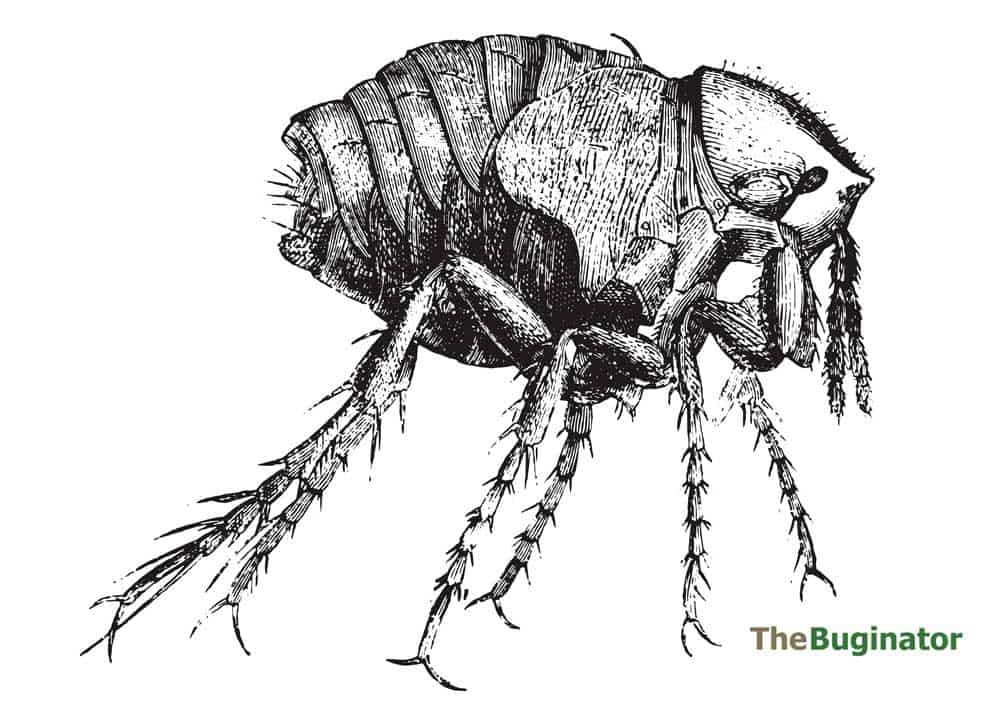
Chiggers are tiny mites that live in grasses and bushes. They can be found worldwide, so they’re a common pest everywhere from Tokyo to Toronto, and they’re easily distinguished by their bright red bodies. This coloring sometimes leads to the nickname “red bug” or “berry bug.”
Chigger bites aren’t pleasant. They cause redness, itchiness, and irritation, often in the form of bumps or welts. The more serious bites might turn into blisters.
Oftentimes, people get bitten in clusters, which can add to the misery with multiple rash-like itchy spots.
Chiggers bite humans to feed on their blood. Interestingly, only the larvae do this; adult chiggers mind their own business.
The good news about chiggers is that they don’t pose a serious risk to humans. While their bites can be uncomfortable, they aren’t usually dangerous.
Jiggers
Scientific name: Tunga penetrans
Common names: Sand flea, chigoe flea, jigger, jigger flea
Range: South and Central America, Africa
Habitat: Sandy areas like beaches
Appearance: Fat, round, and tick-like bodies
Risk to humans: Severe
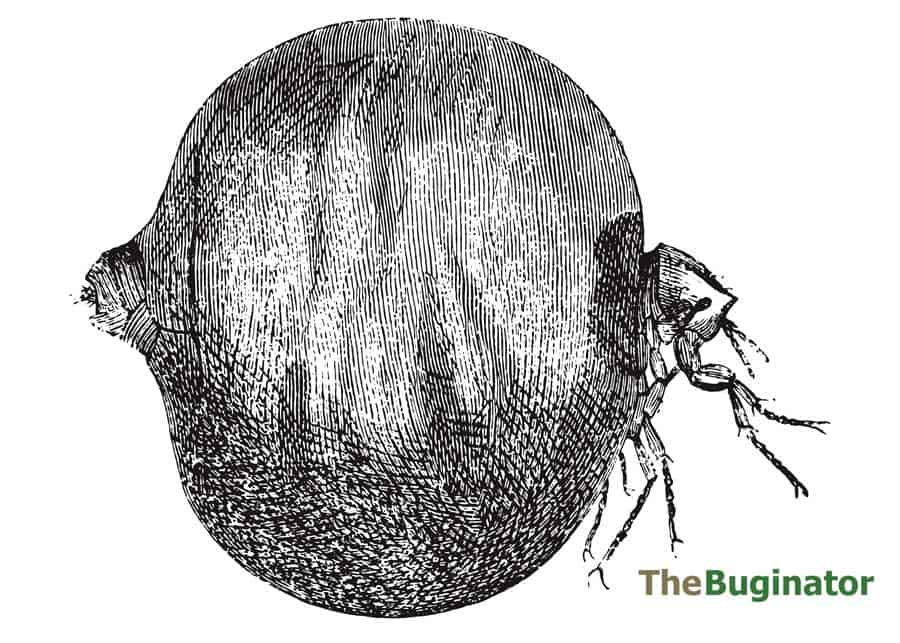
Jiggers are a type of sand flea that lives on beaches. They’re native to Latin America, but they’ve also been introduced to places like coastal Africa because of human transference.
Jiggers look like translucent or pale white ticks. When spotted in the wild, they’re usually in an engorged, post-feeding state, so they can seem quite large even though they’re typically less than a millimeter long.
The biting jiggers are the adult females. While they like to feed on blood, the primary purpose of their bite is for reproduction. They actually burrow into the skin of human feet to help them gestate and expel eggs.
In addition to the “gross” factor, jiggers can also be highly dangerous to humans. Their bites cause small rips and tears in the feet that let in all kinds of germs. And while under the skin, they defecate.
On top of that, the females die after expelling their eggs, and their rotting bodies can become trapped under the skin if they don’t naturally slough off.
Ultimately, all of these bacteria-breeding conditions can cause a number of infections.
Bite victims can suffer everything from sores and fevers to mobility issues because of disfigured feet. Some people even die from complications like gangrene.
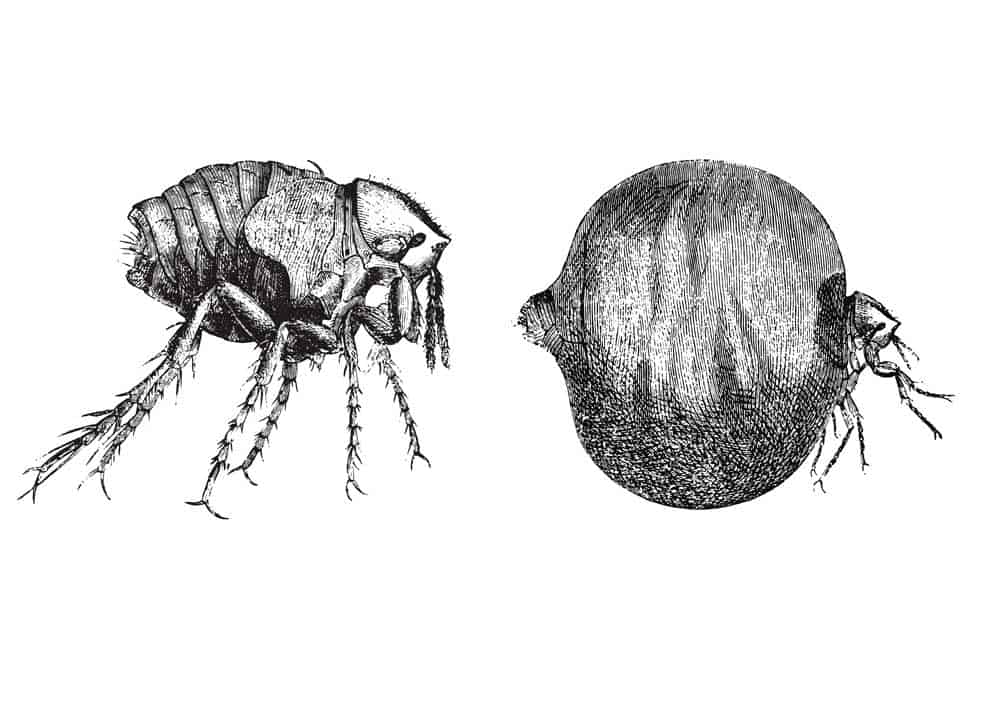
Chiggers Vs Jiggers: FAQ
Are chiggers and jiggers the same thing?
No. Chiggers are a kind of mite, and jiggers are a kind of flea.
They both bite humans, but other than that, they look different, live in different places, have different habitats, and pose different levels of risk to humans.
Learn more about little black bugs that bite.
4 Differences: between chiggers and jiggers?
There are several key differences between chiggers and jiggers:
- Appearance: Chiggers are small red mites, and jiggers are bloated whitish fleas.
- Habitat: Chiggers live in forests, gardens, and grasslands. Jiggers live in sandy places like the beach.
- Geographic range: Chiggers can be found worldwide while jiggers are limited to Central and South America and parts of the African coast.
- Bite: Chiggers can cause small red bumps or rashes anywhere on the body. Jiggers cause white lesions on the feet that turn black when infected.
Which is more dangerous, the chigger or the jigger?
Jiggers are more dangerous than chiggers. Chiggers are just itchy garden pests; meanwhile, jiggers can cause all kinds of medical emergencies, including life-threatening ones.
More reading: Do Fleas Have Wings?
21 Local Names for Jiggers (Sand Fleas)
Here are the local names and terms for sand fleas around the world. Some are language-specific, while others are regional terms.
| Country / Language | Local Name for Jigger |
|---|---|
| Brazilian Portuguese | Bicho de pé (“foot bug”) |
| Democratic Republic of the Congo | ntanda (Kikongo) |
| Democratic Republic of the Congo | liyanzi (singular), mayanzi (plural) (Lingala) |
| Democratic Republic of the Congo | kabwassa (Tshiluba) |
| Ethiopia | Mujale |
| French Guiana | Puce-chique (French) |
| Gikuyu | ndutu |
| Great Britain | jigger, sand flea |
| Guarani | tũ |
| Guyana | chigga |
| Kinyarwanda and Kirundi | ivunja or imvunja (singular) or amavunja (plural) |
| Latin America (Spanish) | nigua, pique (Mexico, Central America, Bolivia, Colombia, Ecuador, Peru) |
| Luganda | nvunza |
| Luhya | tsiinyende |
| Luo | mineme |
| Madagascar | parasy |
| South Sudan | Tukutuku (Zande language) |
| Suriname | sika |
| Swahili | funza (viroboto vya mchanga) |
| West India | chigoe |
| Yoruba | jiga (from the term jigger) |
Are chiggers and jiggers related?
No. Chiggers and jiggers are both insects, but that’s it.
They belong to completely different families in terms of scientific classification.
Here’s how to get rid of jiggers (sand fleas). And here’s how to get rid of chiggers.
What do I do if I get bitten by a chigger or jigger?
Chigger bites can be treated with over-the-counter creams to reduce itchiness and swelling. There’s no real medical danger, so it’s just a matter of soothing the skin until it heals.
If you get bitten by a jigger, however, you should go to the doctor. They’ll need to extract the jigger and prescribe antibiotics to keep the wound from becoming infected.
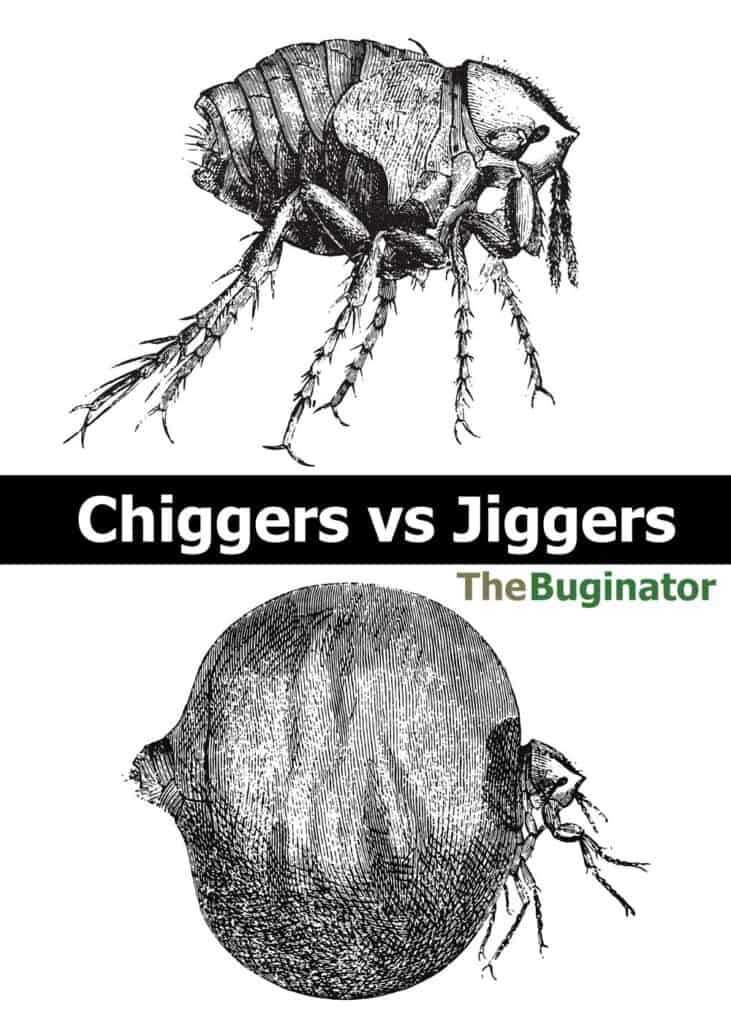
Chiggers Vs Jiggers: The Bottom Line
Chiggers and jiggers have a few similarities, but when all is said and done, they’re completely different species. Make sure that you can distinguish them before you start treating bites or exterminating an infestation on your property!
- About the Author
- Latest Posts
Bryan Haines is a co-founder and writer at The Buginator. And is working to make it the best resource for taking back the outdoors from biting, stinging pests.
He also blogs about travel at Storyteller.Travel and photography at Storyteller Tech. Bryan is a partner at Storyteller Media, a publishing company he runs with his wife, Dena.
